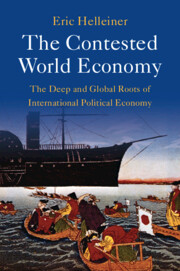Book contents
- The Contested World Economy
- The Contested World Economy
- Copyright page
- Dedication
- Contents
- Preface
- Abbreviations
- 1 Introduction and Overview
- Part I The Three Orthodoxies in a Global Context
- 2 The Rise of European Classical Economic Liberalism
- 3 Economic Liberalism from Non-European Perspectives
- 4 Neomercantilist Reactions in Europe and the United States
- 5 Neomercantilist Reactions Elsewhere
- 6 European Marxist Critiques of Global Capitalism
- 7 The Global Diffusion of Marxist Thought
- Part II Beyond the Three Orthodoxies
- Part III Ending at a Beginning
- Works Cited
- Index
3 - Economic Liberalism from Non-European Perspectives
from Part I - The Three Orthodoxies in a Global Context
Published online by Cambridge University Press: 20 April 2023
- The Contested World Economy
- The Contested World Economy
- Copyright page
- Dedication
- Contents
- Preface
- Abbreviations
- 1 Introduction and Overview
- Part I The Three Orthodoxies in a Global Context
- 2 The Rise of European Classical Economic Liberalism
- 3 Economic Liberalism from Non-European Perspectives
- 4 Neomercantilist Reactions in Europe and the United States
- 5 Neomercantilist Reactions Elsewhere
- 6 European Marxist Critiques of Global Capitalism
- 7 The Global Diffusion of Marxist Thought
- Part II Beyond the Three Orthodoxies
- Part III Ending at a Beginning
- Works Cited
- Index
Summary
The emergence of classical economic liberalism was much more than just a European story. Economic liberal thought found supporters among thinkers from many other parts of the world in the nineteenth and early twentieth centuries, many of whom also adapted it in various ways in response to their local circumstances. This chapter highlights adaptations made by prominent thinkers from the Americas (Thomas Cooper, José da Silva Lisboa, Manuel Pardo y Lavalle, Carlos Calvo, Harold Innis), South Asia (Rammohun Roy, Dadabhai Naoroji), Africa and the Ottoman Empire (Olaudah Equiano, Alexander Crummell, Hassuna D’Ghies), as well as East Asia (Taguchi Ukichi, Yan Fu). The ideas of some of these figures also found an audience in Europe, revealing that liberal ideas flowed not just from Europe to the rest of the world but also in the other direction. Further, some economic liberals outside Europe questioned the European origins of this perspective by claiming its independent roots in their own region. In the Chinese case, the chapter also describes how a contemporary of Adam Smith’s, Chen Hongmou, developed ideas that bore some similarities to European economic liberalism without knowledge of the latter.
Keywords
- Type
- Chapter
- Information
- The Contested World EconomyThe Deep and Global Roots of International Political Economy, pp. 37 - 55Publisher: Cambridge University PressPrint publication year: 2023



